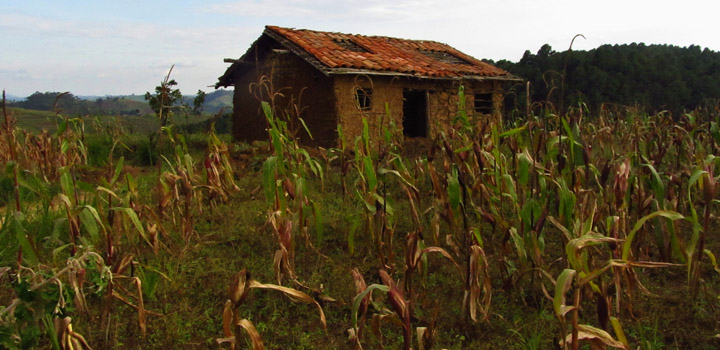Ethiopia
See the following -
Agricultural Policies in Africa Could Be Harming the Poorest
 Published this month in the journal World Development, the study finds that so-called ‘green revolution’ policies in Rwanda - claimed by the government, international donors and organisations such as the International Monetary Fund to be successful for the economy and in alleviating poverty - may be having very negative impacts on the poorest. One of the major strategies to reduce poverty in sub-Saharan Africa is through policies to increase and modernise agricultural production...
Published this month in the journal World Development, the study finds that so-called ‘green revolution’ policies in Rwanda - claimed by the government, international donors and organisations such as the International Monetary Fund to be successful for the economy and in alleviating poverty - may be having very negative impacts on the poorest. One of the major strategies to reduce poverty in sub-Saharan Africa is through policies to increase and modernise agricultural production...
- Login to post comments
Condom Airborne Meds: 6 Ways Drones Could Change Health Care
 Drones have been used to deliver sunscreen to a conference in Palm Springs, Calif., and pizza to a family in New Zealand, but they’re also in the air for far more urgent purposes — such as saving lives. In fact, in some cases, drones could carry defibrillators to heart attack victims faster than an ambulance, according to a paper published Tuesday in the Journal of the American Medical Association. Researchers simulated emergency situations and found they could get automatic external defibrillators to the scene an average of 16 minutes faster by drone than by ambulance...
Drones have been used to deliver sunscreen to a conference in Palm Springs, Calif., and pizza to a family in New Zealand, but they’re also in the air for far more urgent purposes — such as saving lives. In fact, in some cases, drones could carry defibrillators to heart attack victims faster than an ambulance, according to a paper published Tuesday in the Journal of the American Medical Association. Researchers simulated emergency situations and found they could get automatic external defibrillators to the scene an average of 16 minutes faster by drone than by ambulance...
- Login to post comments
Ebola Spreads Exponentially In Liberia, Many More Cases Soon: WHO
Liberia, the country worst hit by West Africa's Ebola epidemic, should see thousands of new cases in coming weeks as the virus spreads exponentially, the World Health Organization (WHO) said on Monday. The epidemic, the worst since the disease was discovered in 1976, has killed some 2,100 people in Guinea, Sierra Leone, Liberia and Nigeria and has also spread to Senegal...
- Login to post comments
Ethiopian Kids Hack OLPCs In 5 Months With Zero Instruction
What happens if you give a thousand Motorola Zoom tablet PCs to Ethiopian kids who have never even seen a printed word? Within five months, they'll start teaching themselves English while circumventing the security on your OS to customize settings and activate disabled hardware. Whoa. Read More »
- Login to post comments
Given Tablets But No Teachers, Ethiopian Children Teach Themselves
With 100 million first-grade-aged children worldwide having no access to schooling, the One Laptop Per Child organization is trying something new in two remote Ethiopian villages—simply dropping off tablet computers with preloaded programs and seeing what happens. Read More »
- Login to post comments
Global OpenHIE Community to Hold 2019 Conference in Ethiopia
 The OpenHIE community will hold its second annual community meeting November 4-8, 2019 in Addis Ababa, Ethiopia. Between 200 and 300 individuals are expected to attend with the ultimate goal of development and efficient and effective operation of national and regional health information exchanges. OpenHIE, short for Open Health Information Exchange, is a global, mission-driven collective dedicated to improving the health of the underserved through open, collaborative development of implementation tools and to supporting country-driven, large-scale health information exchange. Read More »
The OpenHIE community will hold its second annual community meeting November 4-8, 2019 in Addis Ababa, Ethiopia. Between 200 and 300 individuals are expected to attend with the ultimate goal of development and efficient and effective operation of national and regional health information exchanges. OpenHIE, short for Open Health Information Exchange, is a global, mission-driven collective dedicated to improving the health of the underserved through open, collaborative development of implementation tools and to supporting country-driven, large-scale health information exchange. Read More »
- Login to post comments
How "Open Source" Seed Producers from the U.S. to India Are Changing Global Food Production
 Frank Morton has been breeding lettuce since the 1980s. His company offers 114 varieties, among them Outredgeous, which last year became the first plant that NASA astronauts grew and ate in space. For nearly 20 years, Morton’s work was limited only by his imagination and by how many different kinds of lettuce he could get his hands on. But in the early 2000s, he started noticing more and more lettuces were patented, meaning he would not be able to use them for breeding...
Frank Morton has been breeding lettuce since the 1980s. His company offers 114 varieties, among them Outredgeous, which last year became the first plant that NASA astronauts grew and ate in space. For nearly 20 years, Morton’s work was limited only by his imagination and by how many different kinds of lettuce he could get his hands on. But in the early 2000s, he started noticing more and more lettuces were patented, meaning he would not be able to use them for breeding...
- Login to post comments
Mobile Phones to Be Used to Collect Health Data in Ethiopia
Mobile Phones will be used to help health professionals collect data, have it analyzed and receive feedback in a show case project to be launched next week in Ethiopia. The project is led by Technology for Change International and is expected to cost approximately 370,000 US dollars. Read More »
- Login to post comments
Overcoming Obstacles To Accessing Mental Health Services In Ethiopia
“What do you see as one major obstacle to people seeking treatment that may be needed, and what advice or suggestion do you have to help overcome that obstacle, whether for the person, family member, or practitioner?” Read More »
- Login to post comments
Strengthening The Health Workforce through eHealth Innovation: Reflections From The GETHealth Summit
I recently had the privilege of representing CapacityPlus at the Global Education and Technology Health (GETHealth) Summit at the United Nations in New York City, speaking in sessions on distance learning in rural communities and leveraging social media to address the global health workforce gap. Read More »
- Login to post comments
The East African “Miracle Grain” That Could Become The Next Quinoa
There’s a huge business opportunity hiding in the fields of East Africa. Teff, a golden, wheat-like grain, has quinoa-like potential. It’s gluten-free, and boasts all kinds of highly marketable health traits that have made quinoa such a hit in countries like the United States: high in calcium, protein, iron, and amino acids. [...] Read More »
- Login to post comments
The Ethiopian Government And CapacityPlus Lead The Way In Estimating The Cost Of Educating Nurses And Midwives In Africa
In 2011, Ethiopia reported having 29,550 nurses and 2,416 midwives1, or approximately one nurse for every 3,000 people and one midwife for every 34,000 people. In response to this shortage, the Government of Ethiopia has developed an ambitious plan to significantly increase the number of nurses and midwives in the country by 2015 [...]. Read More »
- Login to post comments
Urgent Supplies Through the Air
 Drones can do so much more than take photos and inspect cell phone towers. They can ferry critical supplies to hard-to-reach areas and drop off life-saving packages to disaster survivors. One company, Zipline International in San Francisco, is deploying unmanned aerial systems (UAS) to drop off lifesaving packages of blood in Rwanda—and is the world’s first national drone delivery service. Another company, Windhorse Aerospace in Wells, England, is developing a UAS intentionally designed for a one-way trip. The aircraft is made of combustible or even edible materials that can be taken apart by disaster survivors after it lands and used for fires or meals...
Drones can do so much more than take photos and inspect cell phone towers. They can ferry critical supplies to hard-to-reach areas and drop off life-saving packages to disaster survivors. One company, Zipline International in San Francisco, is deploying unmanned aerial systems (UAS) to drop off lifesaving packages of blood in Rwanda—and is the world’s first national drone delivery service. Another company, Windhorse Aerospace in Wells, England, is developing a UAS intentionally designed for a one-way trip. The aircraft is made of combustible or even edible materials that can be taken apart by disaster survivors after it lands and used for fires or meals...
- Login to post comments
Why African Countries Need to Invest in Research and Citizen Science
 Climate change, HIV/AIDS, recurring droughts, and food insecurity are some of the most pressing issues the African continent has had to deal with in 2016. These issues pose a significant threat to economic, social and environmental development in Africa and create health and economic challenges to the continent. Yet, all of these challenges can benefit from research results spinning off from African universities and research institutions. But to get these results, the institutions must have the funds...
Climate change, HIV/AIDS, recurring droughts, and food insecurity are some of the most pressing issues the African continent has had to deal with in 2016. These issues pose a significant threat to economic, social and environmental development in Africa and create health and economic challenges to the continent. Yet, all of these challenges can benefit from research results spinning off from African universities and research institutions. But to get these results, the institutions must have the funds...
- Login to post comments
OpenHIE 2019 Conference in Ethiopia
The OpenHIE community will hold its second annual community meeting November 4-8, 2019 in Addis Ababa, Ethiopia. Between 200 and 300 individuals are expected to attend with the ultimate goal of development and efficient and effective operation of national and regional health information exchanges. OpenHIE, short for Open Health Information Exchange, is a global, mission-driven collective dedicated to improving the health of the underserved through open, collaborative development of implementation tools and to supporting country-driven, large-scale health information exchange. Read More »
- Login to post comments